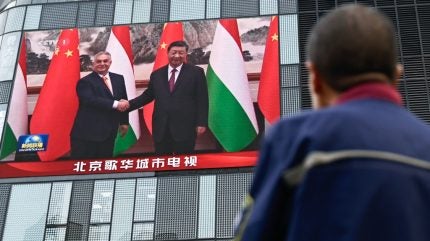
One day after China’s Ministry of National Defence (MND) announced joint army training with Belarus, a close ally in Russia’s war of aggression against Ukraine, Chinese President Xi Jinping met with Hungary’s Prime Minister Viktor Orban to discuss a political settlement over Ukraine that hinges on “no fanning by any party over the flames” according the a MND release from 8 July 2024.
Orban, who took on the rotational EU Presidency this month, was first reported to be travelling to Beijing after a Hungarian military-government Dassault Falcon 7X aircraft was tracked travelling from Budapest to Beijing.
The MND said that in Xi’s conversation with Orban, the Chinese premier had welcomed Orban’s efforts to promote a political sentiment in Ukraine. “China has been actively promoting peace talks in its own way and encouraging and supporting all efforts conducive to a peaceful settlement of the crisis,” said Xi.
Xi is said to have gone on to emphasise the benefits to all parties of an early ceasefire in Ukraine, stating that this was contingent on ‘no expansion of the battlefield, no escalation of fighting, and no fanning by any party over the flames’, according to the 8 July MND release.
The joint army training by China’s People’s Liberation Army (PLA) and Belarusian armed forces, set to begin later this month, is intended to “deepen practical cooperation between the armies of the two countries” according to a MND release from 7 July, and will focus on counter-terrorism operations, including hostage rescue operations.
Following the full-scale invasion of Ukraine in 2022, and the widespread international sanctions agains the perpetrator, Russia, China has been closely associated with the former soviet power’s economic sustainability, eschewing condemnation for the illegal occupation of Ukrainian territory in favour of a measured show of support for Russian President Vladimir Putin.
The Asian superpower has not joined with Russia in espousing the same rhetoric for the invasion of Ukraine, but has been bellicose in its refutation of the influence of Nato and the West beyond their respective regional hegemonies.
However, at a point in time when Hungary, led by Eurosceptic authoritarian Orban, who has been critical of the support to Ukraine, has taken up the six-month rotational presidency of the EU, it is striking to many observers that a meeting with Xi was arranged without notice. President Xi visited Hungary in May, when Orban gave support for Xi’s peace plan for Ukraine.
Belarus has also played a standout role in the invasion of Ukraine, offering support to Putin’s invasion and permitting Russian forces to operate within its borders, as well as making overtures of acceptance towards Putin’s proposals to station nuclear weapons on Belarusian soil.
Taken together in context, the announcements from China’s MND over 7-8 July undermine Xi’s remarks to Orban, proscribing an end to outside provocation, as well as contradicting the sentiment of anti-imperialism China has levelled at the US; Xi has a long history of decrying extension of military force outside of the immediate locality of a country’s own borders, but PLA participation in exercises at Nato’s Eastern flank speaks to the same tendency from China.




